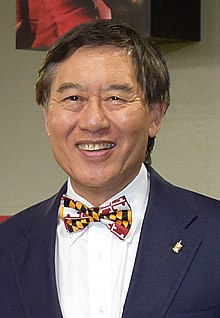Wallace Loh
Wallace Loh | |
|---|---|
陸道逵 | |
 | |
| 33rd President of the University of Maryland, College Park | |
| In office November 1, 2010 – June 30, 2020 | |
| Preceded by | C. Daniel Mote Jr. |
| Succeeded by | Darryll Pines |
| Personal details | |
| Born | 1946 (age 74–75) Shanghai |
| Nationality | Peruvian / American |
| Academic background | |
| Alma mater | Grinnell College (BA) Cornell University (MA) University of Michigan (PhD) Yale University (JD) |
| Thesis | A social psychological study of political commitment in Quebec and Belgium (1971) |
| Doctoral advisor | |
| Academic work | |
| Discipline | Law |
| Sub-discipline | law and social change, criminal justice reform |
| Institutions |
|
| Wallace Loh | |||
|---|---|---|---|
| Traditional Chinese | 陸道逵 | ||
| Simplified Chinese | 陆道逵 | ||
| |||

Wallace Dzu Loh (Chinese: 陸道逵; pinyin: Lù Dàokuí; born 1946) was the president of the University of Maryland, College Park, a position assumed November 1, 2010. He retired from the presidency on June 30th, 2020 and was succeeded by Darryll J. Pines.
Early life[]
Loh was born in Shanghai to a prominent family. His grandparents owned five blocks' worth of downtown Shanghai property[where?], and his father was a diplomat.[1][2] In 1949, when Mao Zedong took over China after the Communist Revolution, the Loh family sought asylum in Lima, Peru.[1] He went to the United States for college, earning a bachelor's degree from Grinnell College. He later earned a master's degree from Cornell where he was elected for membership in the Telluride House,[3] a Ph.D. degree in psychology from the University of Michigan,[4] and a J.D. degree from Yale Law School.[5]
Academic career[]
This article contains content that is written like an advertisement. (February 2020) |
Before becoming the president at University of Maryland, College Park, Loh spent three decades in higher education. He has been dean of the University of Washington Law School, vice chancellor of the University of Colorado, a dean at Seattle University, and most recently provost at the University of Iowa where he oversaw budgets and personnel for the state university's eleven colleges.
During his career in academic administration, Loh has led campaigns to curb underage drinking at University of Iowa, and more recently, to diversify the University of Washington Law School.[5][6]
In his position as President of the University of Maryland he led many initiatives. During his leadership, the university saw a 13.8% increase in underrepresented minority graduation rates, and a decrease in the gap between white and underrepresented minority students by 6.1%.[7] He wrote an editorial in Time magazine discussing the importance of an open dialogue on cultural differences between the student population.[8] He also participated in the planning and development of a memorial square to Frederick Douglass to honor his contributions to America's quest for freedom, liberty, and equal rights.[9] In President Loh's vision, a university should have a social responsibility for the world to provide an education of humanities and social science programs to citizens. Therefore, Loh deems that a university should have both humanities, arts, and social programs and STEM programs balanced. He defends for humanities and social programs when other universities are eliminating these programs for reasons that these programs are not popular in job market.
The University of Maryland ranks among the top five quantum computing research universities in the United States and among the top 12 in the world, according to The Quantum Daily, a quantum computing news website. In US News and World Report's 2020 rankings of 1,500 universities (across 81 countries) of the "best global universities," University of Maryland's College Park campus is ranked 51st in the world, 30th among all U.S. universities, and 15th among all U.S. public universities. Separately, University of Maryland's Robert H. Smith School of Business is No.2 in Financial Times’ 2018 ranking of Master of Finance programs in the United States. According to U.S. News & World Report Rankings 2017, Maryland's iSchool Earns National Ranking No.8 in Library and Information Studies. [10] Moreover, Maryland Terrapins has achieved
